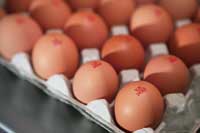Lion eggs opts for on-farm egg stamping

In a move to guarantee traceability and combat fraud, by the end of next year all Lion eggs will be stamped with the method of production before they leave the farm.
At a recent meeting of Lion egg subscribers, members voted for a rule change which will introduce on-farm stamping for all Lion egg producers.
Eggs from caged birds will be brought under the rules speedily, and by the end of this year all Lion cage eggs will be marked with the producer code – which shows the system of production – the country of origin, and the farm where the eggs were laid.
The scheme will be rolled out to free-range, barn and organic sectors during 2010, with all such units expected to comply by the end of the year.
Mark Williams, chief executive of the British Egg Industry Council, said: “We are continually looking at ways in which we can improve the code. Ensuring that Lion eggs are marked on-farm will improve traceability still further.”
It is expected that most large packers will finance the supply of the printers to each farm. Oakland Farm Eggs supplied all its units with printers a year ago, and Noble Foods has promised to pay for the on-farm printers for all its own units. Others are expected to follow suit.
McDonald’s suppliers are already supplied with on-farm printers to ensure traceability, while any unit with its own egg round already has to print on-farm by law.
Larger units with farm packers simply have to add the printer to the machine. Smaller producers will have to stamp manually on 30-egg trays, which will involve some extra labour and time.
There is a view among some free-range producers that stamping eggs is unnecessary as long as all eggs from cages are stamped on farm.
One of those against the change is Scottish producer John Campbell, of Glenrath Farms. Speaking just days before the meeting, he said: “It is right that on-farm stamping should be introduced for cage systems to help prevent egg fraud. But introducing on-farm stamping for free-range producers is expensive and unnecessary because free-range eggs are not the problem when it comes to fraud.”
Chairman of British Free Range Egg Producers (BFREPA) and egg producer Tom Vesey said he was in absolute favour of it.
“It will be expensive, and more difficult for the smaller producers, but it’s something we actually have to do.
“We have to show traceability. If we don’t do it we could be at risk because people could say we’ve got something to hide.”
NFU poultry board chairman Charles Bourns said it was a necessary move to protect the integrity of the Lion egg.
The expectation that a previously widely-reported case would finally come to court next year, alleging the passing-off of cage eggs as free-range, could generate significant adverse publicity, he warned.
If the case was proven, the industry could respond that it had taken steps to make sure it couldn’t happen again, said Mr Bourns.
“The last thing you want is to lose the integrity of the product. With 2012 round the corner, and if we can’t get an intra-community trade ban for conventional caged eggs, we’re going to need the Lion for all it’s worth to protect us from imports.”
